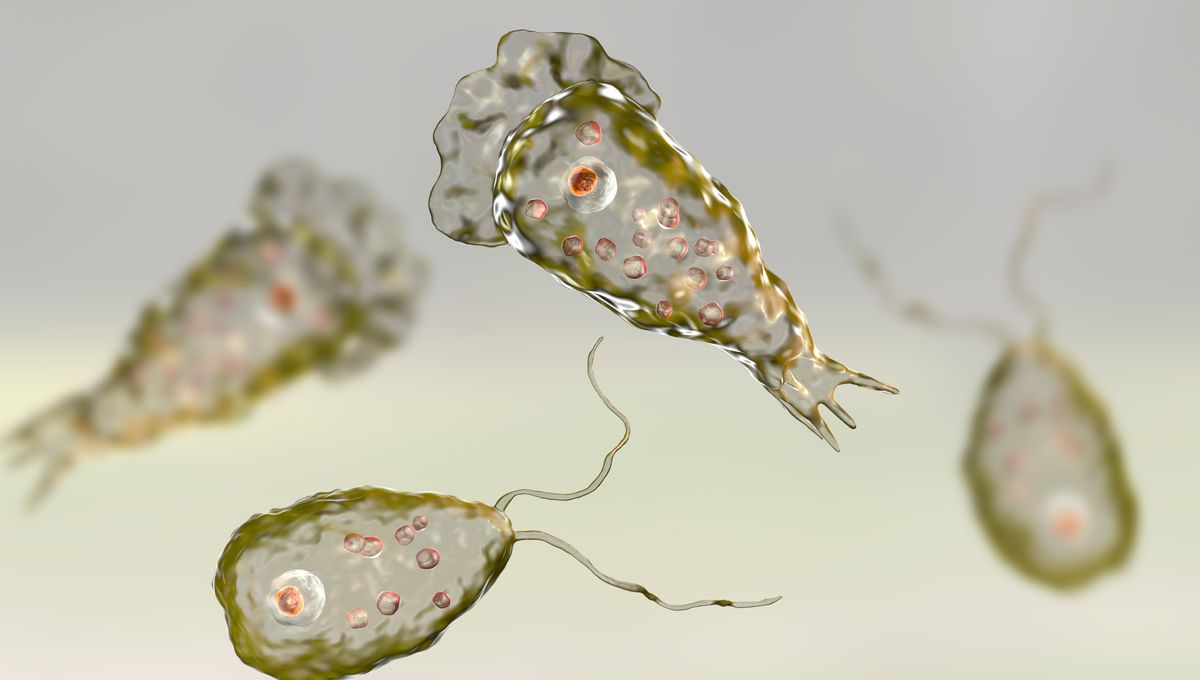
Nothing is as joyous for a child as jumping into a local lake for a quick refreshing dip on a hot and sweaty day. Unfortunately, a brain-eating amoeba may be lurking underneath the surface, waiting for a chance encounter with an unsuspecting human.
There have been many summer cases over the past few years. Last year, we reported two children, one from Northern California and the other from North Carolina, who passed away from this organism. And now, it has been announced this week that a child has died after swimming in the Elkhorn River in eastern Nebraska, with the main suspect being a brain-eating amoeba. But what exactly is this disease, and how worried should we be?
Firstly – so we do not scare anyone too much – this disease may be more than 97 percent lethal but it is 100 percent preventable and rare, according to the Summer is Amoeba Season Campaign. It is recommended that you avoid activities that force water up the nose and avoid using a Neti pot (a contraption for nasal congestion) with unboiled water or untreated water. A nose clip is always recommended when taking a frolic in fresh water.
What is a brain-eating amoeba?
This organism is called Naegleria fowleri and is an amoeba – a single-celled animal that extends finger-like projections of protoplasm to catch food and move about. It is free-living and lives in warm freshwater sources, like hot springs, lakes, and rivers, as well as untreated swimming pools, well water, and runoff from powerplants.
Of course, their normal meal is not normally human brains but rather other organisms like bacteria found in river and lake sediments.
It has three life stages: cyst, trophozoite, and flagellate. The cyst stage is extremely robust and can withstand exceptionally harsh conditions – they can persist if the water gets cold or freezes or if the water dries out (cysts can live in the dirt or dust) for a few months.
The flagella stage are fast swimmers and only occur when there is a reduced food source. They will turn back to trophozoite when the conditions are more in their favor. The deadliest stage for humans is the trophozoite, as this is the only infective stage, that replicates by binary division.
How does the brain-eating amoeba infect you?
To be infected by this amoeba, water has to go up the nose, and often this is through swimming, recreational playing, or diving into the infected water sources. Just to note, you cannot be infected by drinking contaminated water, it also does not spread via water vapor or aerosol droplets, or by human-to-human contact.
The trophozoite will penetrate the nasal tissue, travel to the cribriform plate (part of your skull between where your eye sockets start), and migrate to the brain through the olfactory nerves (the nerves that help you smell).
Once in your brain, this parasite can happily thrive and it eats, grows, and spreads throughout the organ. The eating part is what causes the most issues: They engulf cells, and this causes bleeding and tissue death. This amoeba brain buffet also produces an enormous inflammatory response, which causes white blood cells to come crashing into the site. These events cause the brain to swell and the skull pressure to increase, this leads to primary amoebic meningoencephalitis (PAM), coma, and death can follow soon after.
What are the first symptoms?
This infection is very rapid and symptoms can occur between one to 12 days after infection. In stage one, the person will get a severe headache that is located between the eyes, nausea, and vomiting. At stage two, the person will often develop a stiff neck, which can be misdiagnosed as classic meningitis, and can experience seizures and hallucinations.
Is there a treatment for this infection?
Due to the very rapid nature of this disease, it is very important that it is diagnosed as quickly as possible. As sometimes a delay of even a few hours can be fatal.
Infection is very rare, and as such, there have not been many clinical studies. However, there have been five documented survival cases, four from the U.S. and one from Mexico. These people survived after an early diagnosis and a very intensive treatment schedule. In some cases, the person is cooled to below normal body temperature to try and help with the swelling of the brain.
Who is most at risk of infection?
N. fowleri can occur all around the world, but in the United States most cases come from southern-tier states. Males and children are more at risk of infection than anyone else: It is thought that this demographic is more likely to participate in water activities.
The riskiest times to take a dip are in July, August, and September, as the water temperatures tend to rise.
Is this going to be an emerging parasite?
Between 1962-2021 there were 154 confirmed cases of PAM caused by N. fowleri in the United States. Overall, there has not been an increase in cases in the United States, but studies have found that, globally, cases are increasing. For example, in Pakistan, there have been 146 cases reported in Karachi in the last decade. But it is uncertain whether this increase is due to a heightened awareness of this disease or actual growing case numbers.
Despite this, there is a concern that climate change is going to change the prevalence of this parasite. As the Earth gets hotter, and water gets warmer, there will be more potential amoeba-friendly spots that people will be jumping into.
So, be safe and wear a nose clip!
Source Link: Brain-Eating Amoeba Has Caused Another Fatality This Year – But Do They Actually Eat Your Brain?